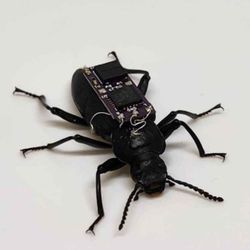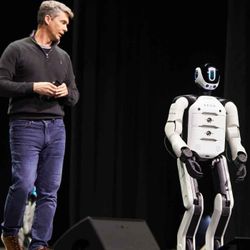Share

Tech and Science Daily | The Standard
How Lasers could soon power our energy
Season 1
•
What if we could generate energy through quantum lasers? We speak to the CEO of Marvel Fusion who’s doing just that, plus we speak to Zulu Forests who are building new habitats through technology and science. A volcanic eruption on La Palma could last 'up to 84 days'. Nasa’s making changes as we move into an era of private space exploration. It appears life on Mars never stood a chance. And, if you’re missing your Nokia 3310 then you’re in luck.
More episodes
View all episodes

The phone case which burns like human skin - but why do we need it?
10:24||Season 1O2, with backing from The British Skin Foundation, have created a first-of-its-kind phone 'Skincase', designed to highlight the sun’s harmful UV rays on human skin.We join researcher and creative technologist Marc Teyssier, who has previously designed artificial skin for robots.The eruption of an Indonesian volcano has left locals finding ‘breathing painful’.Mount Lewotobi Laki Laki erupted twice on Monday, sending extremely hot ash and rock debris up into the air, around 11 miles high.LOTR's Peter Jackson is resurrecting a giant extinct bird from 600 years ago.He’s teamed up with Colossal Biosciences, which worked on the genetic rebuilding of species such as the woolly mammoth and dire wolf.Also in this episode:-Barbie has launched its first doll with type 1 diabetes.-Live facial recognition technology could be used to catch London Underground fare dodgers.-And finally, Sid the sloth's Ice Age migration was actually unusual…
New malaria treatment for young babies approved
10:40||Season 1A malaria treatment has been approved for use on babies and young children for the first time.Has our understanding of “Space Ice" been wrong this entire time?Tech & Science Daily spoke to lead author, Dr Michael B. Davies, from UCL and the University of Cambridge, who says their discovery could also conflict with a speculative theory about how life on Earth began.Plus, the UK Government will test its emergency alert system on September 7th, in its second ever nationwide drill.Also in this episode:-Twitter co-founder Jack Dorsey unveils a new Bluetooth app called Bitchat.-The first-ever guide to better support and protect patients across the world who are considering potentially pioneering, risky, surgery, has now been published.-YouTuber ‘Angryginge’ arrested for 'thousands of pounds worth of criminal damage caused to F1 car'.-“The science is clear”: McVities pull Jaffa Cakes from a biscuit museum exhibit.
REPLAY: Mark Hyman (Brave New World)
15:51||Season 1In this excerpt from the Brave New World podcast, Evgeny Lebedev talks with Mark Hyman about the rise of longevity medicine, and what lifestyle changes we can make to enhance our health span.To hear the episode in full just search Brave New World Evening Standard.
Studying elephants vibrations used to communicate enormous distances
11:34||Season 1From the Royal Society Summer Science Exhibition, we speak to Dr Beth Mortimer, from the University of Oxford, who is measuring seismic vibrations to track African elephants’ communication.Elephants can feel vibrations through the ground from enormous distances, which can dictate their travelling routes through the savannah.Beth and her team buried 1,200 seismic nodes underground to measure the ground vibrations, which are more commonly used to study things like earthquakes and volcanoes.Archaeologists working on an excavation site in the UK’s Cotswolds have discovered evidence of an Iron Age-Roman settlement.This comes after the find of two iron Roman cavalry swords.Plus, researchers in Spain say that even the softest of veg can damage our teeth, too.Also in this episode:-Jarvis Cocker marks the 100-year anniversary of the Shipping Forecast.-Why you may want to send a few more emojis to your loved ones... -The lost voices of monks to be heard again after 500 years.
Crete wildfire: rapidly spreading blaze threatens holiday beach resorts
11:21||Season 1A huge wildfire is spreading through the Greek island of Crete, fuelled by strong winds.The blaze began on Wednesday afternoon near Lerapetra, and so far, at least 1,500 people from villages, tourist resorts and coastal hotels have been evacuated.It comes as a scorching heatwave grips the European continent, with temperatures reaching over 40C degrees.The Royal Society’s free Summer Science Exhibition is back for another year.One particular entry to this year’s exhibit is London-based Drake Music, and their technology, titled PhotoSynth, which, powered by machine learning, allows users to create music from facial expressions.We hear from the CEO of Drake Music, Sally Currie.Plus, vanilla, the universally popular flavour which is used in food, cosmetics and pharmaceuticals, could be under threat due to climate change.Also in this episode:-Microsoft: layoffs across gaming division.-Japanese island experiences 900 earthquakes in two weeks.-A new interstellar object is moving through our solar system.-And finally, Sophie Ellis-Bextor says AI cannot copy human connection in music.If you have been affected by the wildfires in Crete, get in touch by emailing megan.howe@standard.co.uk
The 'catastrophic failure' that led to Heathrow substation fire
11:15||Season 1The fire that caused the chaotic shutdown of Heathrow airport in March was likely caused by a “catastrophic” failure of a crucial component at an electricity substation that should have been prevented, Britain's National Energy System Operator (NESO) said in a report on the incident on Wednesday.Also in this episode:Composer and violinist Ellie Wilson on her immersive melody to highlight the fragility of ecosystems under threat from climate change and habitat loss. The 12-minute track is titled Moth X Human and has been made in collaboration with the UK Centre for Ecology and Hydrology.The FBI have warned that cyber gang, Scattered Spider, are now thought to be targeting the airline industry.E1 Series powerboats make London debut with spectacular display on the Thames.England’s warmest June on record and the UK’s second warmest temperatures since 1884.Europe's heatwave: the Eiffel Tower shuts its top level, forest fires, and soaring 45+ degree temperatures are recorded in parts of the continent.UK watchmaker gives back time to those who need mental health support.Superman soars 1,000ft over The Shard.
Beetles with microchip backpacks to help search and rescue crews
09:09||Season 1The common beetle could soon be our new superhero.Dubbed ‘Cyborg’ beetles, these insects will be equipped with microchip backpacks, designed to help search and rescue crews locate survivors within hours instead of days after a disaster.Scientists from the University of Cambridge have discovered that some species of microbe found in the human gut can absorb toxic and long-lasting ‘forever chemicals’, otherwise known as PFAS.Tech & Science Daily joins lead author, Anna Lindell, VP of Technology at Cambiotics. Anna told us about their plans for a new probiotic which could help protect the gut from the effects of PFAS.Plus, Mark Zuckerberg announces the creation of Meta Superintelligence Labs, as he continues to compete against Google and OpenAI.Also in this episode:-Trump says he has 'a group of very wealthy people' to buy TikTok-Why Glastonbury won’t return to Worthy Farm in 2026-How deep sleep can boost 'eureka moments-Instagram now lets you share Spotify songs with sound to Stories
REPLAY: Ryan Holiday (Brave New World)
15:19||Season 1In this replay preview of Brave New World, Evgeny Lebedev speaks with Ryan Holiday about the modern media landscape, echo chambers and the value of Stoic leadership.To hear the episode in full just search Brave New World Evening Standard.
Meet AEON: the new AI humanoid robot for industry (special)
12:56||Season 1How does AEON compare to Elon Musk's Tesla humanoid, Optimus?We’re joined by the President of Hexagon’s Robotics division, Arnaud Robert, who is behind AEON, a humanoid robot capable of autonomously completing various tasks.Hexagon recently revealed AEON at the Hexagon LIVE Global event.They say their robot is designed to support the automotive, aerospace, transportation, and warehousing industries, safely and without direct supervision.The robot has been designed to 'meet real-world customer needs' and 'address labour shortages'.They're rolling out their humanoids in early 2026.